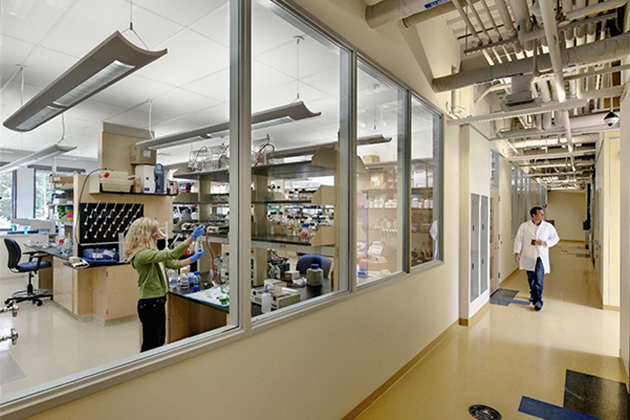A new construction project now underway on the UConn Health campus will double the University’s total business incubator space for the cultivation of startups throughout the state.
The $19.4 million addition to the Cell and Genome Sciences Building represents an expansion of UConn’s Technology Incubation Program (TIP), which provides lab space and services to dozens of companies that are commercializing technology.
The project is the latest in a series of initiatives funded by Bioscience Connecticut, a nearly $1 billion package of state investments, which supports the vision of creating a regional hub that can serve as a catalyst for biomedical science and health care advancement, and the anticipated economic growth associated with it.

“The incubator expansion at UConn Health is a great opportunity for Connecticut’s citizens and industry,” says Jeff Seemann, vice president for research. “This expansion provides a physical resource to capture the companies and jobs emanating from Bioscience Connecticut for the state, and ensures that opportunities rapidly develop by extending a bundle of services designed to grow and sustain them.”
The first occupants are expected to move into the new TIP space at UConn Health by December 2015. The expansion in Farmington will add 28,000 square feet for new tenants, which have the option to develop their ideas in high-tech facilities at the Farmington, Storrs, or Avery Point campuses.
“UConn’s incubator offers even greater value by providing access to unique assets and expertise that can only be found at a leading research institution,” Seemann adds.

The University provides a variety of support for the ventures, ranging from access to scientific expertise to address research and development challenges, to business planning and investor cultivation. And new startups can take advantage of the core research facilities, University library, computer network, entrepreneurial education and networking programs, and student internship programs.
Timothy Folta, faculty director of the Connecticut Center for Entrepreneurship and Innovation at the UConn School of Business, notes that incubators provide a variety of benefits to both the startup companies and the University.
In addition to removing some of the risk and startup costs for entrepreneurs, the programs facilitate a knowledge exchange.
“There is increased evidence that geographic clusters of economic activity – think Silicon Valley or the Research Triangle – promote a spillover of knowledge, another advantage of the incubator concept,” Folta says.

Tenants of the TIP space are diverse, performing work in the physical and life sciences, and leading innovations in medical devices, informational technology, and advanced manufacturing. While many tenants are startups, existing firms also are able to join the program to pursue new opportunities or to develop partnerships with UConn faculty.
In the decade since the program began, more than two dozen businesses have been launched – reflecting a startup success rate of 60 percent – well above the national average of 25 percent.
Among those are such ventures as Metrocrops, a company owned by UConn alumni and leveraging hydroponic expertise and proprietary LED lighting technology for high-density urban farming. Another TIP graduate, IMCORP, has been recognized by INC. Magazine as one of the fastest-growing engineering companies in the U.S. for six consecutive years. IMCORP built on technology developed at UConn that detects breakage in underground utility cables.
Newer ventures include biotechnology startup BIOARRAY Therapeutics Inc., which was founded in Massachusetts and moved to Connecticut. That company is developing predictive diagnostic tests, based on cancer genes, to choose the most efficacious treatment for cancer patients.
The new facility will add to UConn’s ability to serve industry that fuels the economy. In 2013 alone, the 20 companies in UConn’s incubator program employed 58 full-time and 48 part-time staff members, secured 13 patents, and had another 56 patents pending. Overall, Bioscience Connecticut construction has created more than 2,800 construction jobs, with 83 percent of the contracts going to Connecticut companies.


